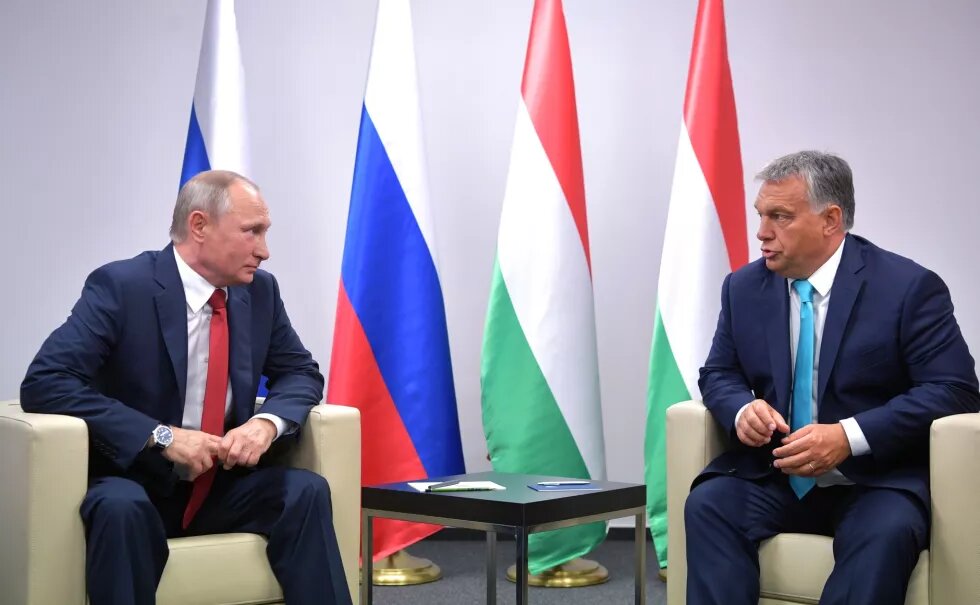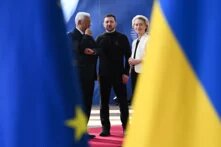After years of perpetual rhetorical wars and shadow-boxing with Brussels, international liberal elites and other mostly imaginary enemies, PM Viktor Orbán got himself a real war to deal with. Orbán and most of his cabinet underestimated the possibility of Russia’s invasion of Ukraine, so after spending weeks confidently claiming Russia would not attack Ukraine, there was a temporary sense of confusion when it did. After a couple of days, the ruling party was able to rewire its communication and use the war to its advantage domestically while doing just the required minimum internationally.

Nothing new under the sun
It is worth remembering that in January 2014, mere weeks before the illegal annexation of Crimea, PM Orbán and President Putin met in Moscow to sign the deal on the Russian construction of the Paks II nuclear power plant. This move cemented Russian influence over the Hungarian energy sector for decades. A month later, in late February 2014, “little green men” started to occupy the Crimean Peninsula, which led to the illegal annexation of Crimea and the war between Russia and Ukraine. Even then, Orbán’s reaction was lukewarm: He emphasized the necessity of peace and the defense of Hungarian minorities in Ukraine, but also warned Hungarian and European politicians about the dangers of their own “irresponsible” behavior.
A similar thing happened in February 2022 when, weeks before the invasion began, Orbán met with Putin for the 12th time in Moscow and presented the trip as a successful 'peace mission', ignoring signs of the looming military invasion of Ukraine. At the joint press conference, the Hungarian prime minister not only failed to confront the aggressor, but even argued against "failed" sanctions despite Russian troops deploying on Ukraine's border. He announced the purchase of more Russian gas and called 2021 the best year for Hungarian-Russian cooperation. Additionally, he failed to stand up against Russia’s demands to essentially roll back Hungary’s NATO membership, which is still a crucial part of the Hungarian security and defense policy and enjoys wide popular support among the public.
Orbán swiftly changed course but remained an outsider
After the invasion, the government was forced to change course swiftly and to condemn the Russian aggression, sidelining its pro-Kremlin stance. Orbán was forced to adopt a different posture condemning Moscow’s actions while also saying Hungary would not send weapons to Ukraine. “Together with our European Union and NATO allies, we condemn Russia’s military attack,” he said. He also joined EU leaders later that evening in signing off on a large-scale sanctions package targeting multiple sectors of the Russian economy.
Hungarian diplomacy has been cautious in making these corrections, since in Hungary foreign policy mainly serves domestic purposes. Fidesz is trying to appease its increasingly pro-Russian voter base, as over 55 per cent of Fidesz voters would welcome closer relations to Moscow instead of Washington. This sentiment is the strongest among younger (18-39) Fidesz voters, 65 per cent of whom would favor Russia over the US. The government is also trying to protect the economic interests of the regime’s cronies who are profiting from joint projects with Russia (e.g. Paks II.). These factors have caused contradictory moves in both the government’s foreign policy and its communications.
The outbreak of the war completely transformed the Hungarian election campaign, too. Fidesz was forced to tailor its campaign to its divided voter base. While government communications and some articles in pro-government media condemned Russian aggression and focused on efforts to help those fleeing Ukraine, other reports in the state and pro-government media began to spread clearly pro-Kremlin disinformation narratives. The ruling party also found its main narrative: Hungary wants peace – a unifying message for the Fidesz electorate, a large part of which still views Russia favorably.
On 15 March 2022, the Hungarian prime minister gave a speech to his supporters at Kossuth Square that sounded as if Hungary was a completely neutral Member State that simply wants to avoid confrontation with anyone. Alongside economic issues, the key message became the fight between the “pro-peace right and pro-war left”, similar to the narrative of the “anti-vax opposition” last year.
Warmongers vs. Peace-lovers
After a controversial comment by opposition PM candidate Péter Márki-Zay during an interview in which he declared that “Hungary must implement the joint decision of NATO. So, if NATO decides to support Ukraine with weapons, of course [Hungary] will support it," Fidesz found their key message. Their entire media space started accusing Márki-Zay and the united opposition alliance of trying to drag Hungary into the war by wanting to send soldiers and weapons into Ukraine. Thus the ruling party could fight the “warmonger opposition” while advocating for “peace” and “strategic calmness”.
Fidesz's position may have been strengthened by the fear of war, and it seems that after a short period of uncertainty, Orbán incorporated people's need for security and stability into his campaign more effectively than the opposition did. As a consequence, Fidesz's campaign focused on repeating the message “War or peace. If we want peace, we should choose the national side; if you want war, support the left." This message was echoed by pro-government gray-zone media and by internet trolls as well.
The Hungarian authorities also enabled the dissemination of Russian war propaganda by not sanctioning state media for presenting disinformation as truth. Their domination of the Hungarian media space has created a nationwide echo chamber where the ruling party has asymmetric access to media space. This inaction of the state authorities gave the ruling party free rein to thematize the war, and the intensity of the spread of disinformation messages caught Hungarian society completely unprepared, presumably contributing to another two-thirds majority for Fidesz. The ruling party’s messages also confused even the generally pro-West and anti-Russian opposition voters, decreasing the opposition parties’ ability to mobilize voters.
It's the economy, stupid
Orbán’s victory meant the Russo-Ukrainian war was no longer an electoral issue, but the topic has remained a central question due to the economic fallout it has caused. Orbán still views the war mainly as a threat to the economic security of the country and his regime. This is reflected in the political communication and structure of the new government, where of 11 ministries at least six deal with economic issues.
At his first international press conference in April after the election, Orbán said he viewed the war as a key factor to his electoral success, since “the Hungarian people want peace, and with a war going on in our neighborhood, they voted for the one who offers the greatest guarantee of peace.” His first priority, therefore, is achieving peace in Ukraine, lobbying for a cease-fire and later for a “European peace conference” to stop the fighting as soon as possible. His second priority would be to “protect families” from the looming economic crisis “caused mainly by the sanctions”. He has started to shift the blame for the economic fallout from Moscow to Brussels.
“We can see that the war and the Brussels sanctions have led to an enormous economic upheaval and drastic price rises. The world is on the threshold of an economic crisis. Hungary must stay out of this war and must protect the financial security of families,” the prime minister stated in one speech.
Overall, Orbán wants the war to end as fast as possible, regardless of the outcome. His utmost concern is the stabilization of the economy, stopping inflation and mitigating economic and political losses as much as possible. According to him, to achieve this the “government needs room for maneuver and the ability to take action immediately”. He has used this pretext to introduce a “state of danger” due to the threat of war. This new special legislative status is essentially the rebranding of the “state of danger” due to the pandemic, and it provides the government with the ability to rule by decree without any checks on its power. The government can “suspend the application of certain laws, derogate from legal provisions and take other extraordinary measures in order to protect life, health, personal property, legal security and the stability of the national economy.”
After achieving increased room for maneuver domestically, Orbán turned outwards. While he and his cabinet supported the previous EU sanctions packages against Russia, they remained at least rhetorically skeptical about their effectiveness. The Hungarian government tends to deliberately exaggerate the impact of sanctions on Russian energy and the expected losses that will result. This skepticism led to a clash between the Hungarian government and the European Commission about the planned oil embargo against Russia. Orbán called the plan a “nuclear bomb dropped on the Hungarian economy” and threatened to veto it. He used his veto power to advocate for exemptions from the ban and financial support, essentially blackmailing the EU for money in exchange for agreeing to the embargo, since Hungary’s Recovery and Resilience plan has still not been accepted by the Commission and the country’s access to other EU funds is threatened by the rule of law mechanism. With the use of the latter mechanism, the Commission can take financial measures if it finds that EU funds are not being used for their intended purpose, because the rule of law, or European values, are being violated. The process can take 6-9 months and at the end, the Council of the EU may decide to suspend or block part of EU funding if it is proven that the EU’s financial interests are directly affected by a breach of certain rule of law standards. As a consequence, the Hungarian government could find itself partially cut off from EU funds by the end of this year.
Although Hungary’s objection to the initial plans was also valuable for other countries like Slovakia and Czechia, the protracted battle with the Commission served mostly domestic purposes for Orbán, as he could sell his image of being a fighter and a powerful international actor back home. However, the outcome of this battle is just a partial success for Orbán, as he got time but no money out of the deal. Nevertheless, in Hungary, Orbán can portray himself as the defender of families, as Hungary will be able to maintain its utility cost cuts and its price freeze on fuel.
These examples show that unlike Poland and other countries in Central and Eastern Europe, Hungary (or more specifically the Hungarian government) refuses to subordinate domestic economic interests to the international effort to help Ukraine. This reluctance to help a country suffering from Russian military aggression and potential genocide is especially baffling since Hungary has had its fair share of historical Russian military occupation and a significant Hungarian minority still lives in Ukraine. However, the fact that Fidesz’s propaganda has been anti-West and pro-Kremlin over the last decade means a significant portion of Hungarian society now accepts the government’s point of view about the war. This faked neutral stance towards the war in Ukraine is in direct conflict with Hungary’s national interests and its place in the Western alliance. A Russian military victory and a weakened or subjugated Ukraine would be a catastrophe for Hungarian security interests and for the rules-based international order, too. Even Orbán admitted previously that “Ukraine’s independence and viability are intrinsically in Hungary’s direct interest”. Hungary’s interests would only benefit from a Ukrainian victory, therefore, which is the only way to achieve long-term peace in the region.


